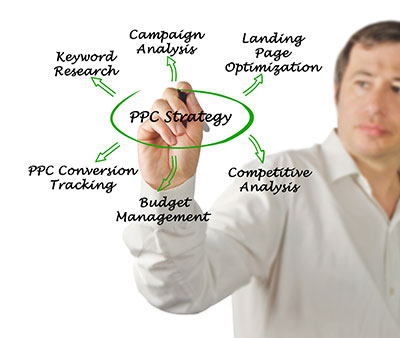Unlike insurance-based medical practices, physicians in aesthetic practices recognize the need to market themselves, as they do not have a relationship with health insurance companies to list in-network practices on their insurance websites. To that end, how much of your budget should go to PPC?
What Is PPC?
PPC stands for Pay Per Click. Essentially, it is online advertising to “buy” visits to your website rather than “earning” visits via organic marketing, such as search engine optimization. When people click on your links or ads, you pay a fee. In general, PPC ads are at the top of search engine results, so you’re seen quickly. Other forms of online advertising on browser pages include banners and display ads.
Advertising via PPC gets your brand in front of potential customers, and you can spend as little or as much as you want. You might start with a fairly small budget, maybe $500 per month, and add more as you get results.
How Does PPC Work?
When a consumer types a keyword or keyword phrase, such as “breast augmentation surgeon” into a search engine such as Google, Yahoo, and others, and your website appears as an “answer” to that keyword search, the consumer that clicks through to your designated website page triggers a fee for each click. Hence, Pay Per Click.
What Does PPC Cost?
If 10 consumers click through to your website, that’s 10 separate fees. Fees can range from a very low 5c per click for “low value keywords” to fairly costly fees for “high value keywords,” such as “breast augmentation,” for example. Furthermore, the cost per click can vary from
For example, imagine a prospect typing this into a search engine (Google, Yahoo, etc):
The keyword phrase “breast augmentation” is a higher value keyword compared with keywords like “skincare” or “laser skin tightening.” Therefore, that keyword will cost you more money per click than those lower value keywords.
Furthermore, if your practice is located in Memphis, you will pay more per click than if your practice were located in Poughkeepsie, for example. The more populous areas fetch a higher PPC fee, primarily due to the level of competition.
How To Pay for PPC
Most physicians contract with a PPC manager to handle their PPC. The manager charges a monthly fee ranging from $500 or more to create the ads, monitor the results with a regular report to you (usually monthly), and make adjustments as needed.
You can get an idea as to cost by reviewing this Keyword Planning Tool. If you plan to do PPC without a manager to help you, this will get you started. Also check out Google Ad Words, where you can set up an account, choose keywords, and fund your initial run.
Other PPC opportunities
Although search engine advertising is the most popular form of PPC, social media sites are hot on the search engine’s tail. Ads on Facebook, Twitter, Instagram and TicTok are also PPC opportunities.
To view the opportunities on Facebook, click this link to create an ad account on Facebook and run ads there.
Instagram also runs ads. This link will get you started on Instagram Ads.
How Much Should You Budget for PPC?
That’s the million dollar question. Our advice is to start small, whether you’re utilizing the services of a PPC manager or doing this on your own. Put in $500 to start. Check your results. That $500 might last a month or it might last a week, depending on frequency of ad placement. It’s the job of the PPC manager to guide you through the financial decisions involved with PPC. Since this is what PPC manager’s do full-time, they are a worthy investment.
It’s wise not to assume that PPC will hold more value to your bottom line than other marketing opportunities, such as participating in local fundraisers and marketing through your customer base.
See these blog posts for additional affordable marketing tips:

